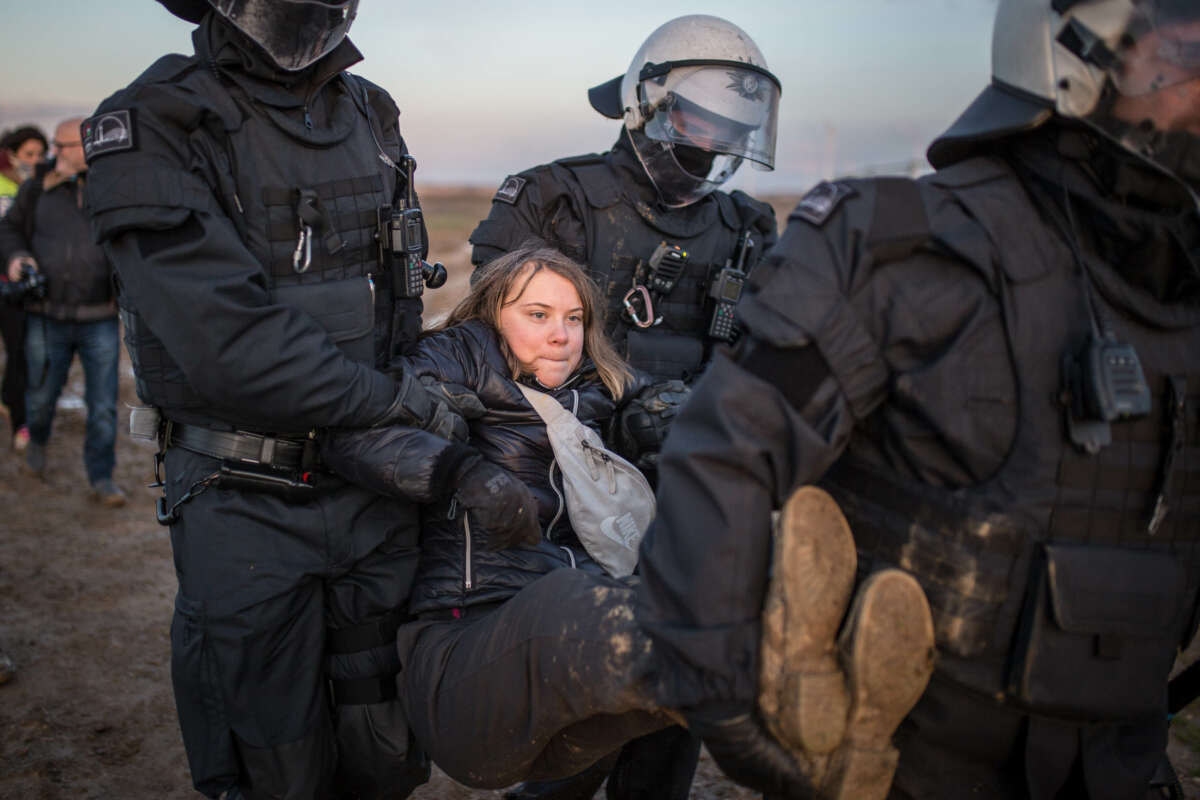Support justice-driven, accurate and transparent news — make a quick donation to Truthout today!
Greta Thunberg made international headlines this week when she and other climate activists were briefly detained by police at a protest against the expansion of a coal mine in Germany.
Thunberg was among the thousands of protesters who arrived to denounce the expansion of the huge Garzweiler open-cast lignite mine by German energy company RWE. The extraction of lignite (also known as brown coal, one of the dirtiest fossil fuels) requires digging 200-metre-deep ravines that can swallow entire villages — in this case, the abandoned village of Lützerath.
Last week, swarms of police moved into the village in North Rhine-Westphalia to clear the activists, some of whom have been camped there for two years.
But it’s not just the thousands of cops — or even the entire German state — that is shielding the fossil fuel industry’s wanton destruction. An obscure mechanism of international law quietly protects their interests and helps them extract more profits: the Energy Charter Treaty (ECT).
Back in the 1960s, Shell (then called Royal Dutch Shell) envisioned a special kind of international protection for their investments in newly independent Indonesia. Fearing that a potentially unfriendly government might impede its profits, Shell wanted protection that went beyond the traditional national court system.
The Dutch state (always happy to act in the interests of Shell) inaugurated the investor-state dispute settlement (ISDS) mechanism in the 1968 treaty between the Netherlands and Indonesia. ISDS allows a foreign investor to sue a country for certain decisions or actions that might negatively impact its investment in that country.
Since then, hundreds of international bilateral treaties have included ISDS mechanisms, but the system was massively expanded in the 1990s with the signing of the multilateral Energy Charter Treaty.
More than 50 countries are signed up to the ECT, which specifically protects investments in the energy sector. It is the key international agreement used most often by companies to sue states for potentially billions of dollars in compensation claims.
If investors believe government measures endanger their current — or even potential future – profits, they can demand compensation under the treaty. RWE, which is now demolishing Lutzerath in order to extract more brown coal, launched a €1.4bn claim against the Netherlands in 2021 for its ‘coal exit’ law, which would end the burning of coal for electricity in 2030. The case is currently suspended until summer awaiting the decision of the German Supreme Court, which is expected in April.
But energy corporations can extract a lot of public money even when they don’t sue. After Swedish energy company Vattenfall successfully sued Germany for its nuclear phase-out after the Fukushima disaster, the German government decided it must prevent another expensive ECT claim at all costs.
RWE used the ECT to pressure the German government during negotiations over the country’s coal exit (the phasing out of coal-fired power generation). In exchange for RWE waiving its ability to sue under the ECT, the government agreed to pay them unusually high compensation: 2.6bn euros. The deal has since been criticised by independent experts for the generous payouts and the European Commission is still investigating it for illegal state aid.
Time to Abolish the Treaty
There have been protests across Europe against this antiquated and controversial treaty. More than one million people signed a petition to end it. Several leading EU states, including France, Germany, the Netherlands, Poland and Spain, have announced they will exit this secret weapon of the fossil fuel industry. Italy has already left. However, the European Commission is doing everything it can to save the treaty.
The events surrounding the demolition of Lutzerath bring home to people in Europe — and across the world — the violent destruction and dispossession that accompanies fossil fuel extraction. Coal is a 19th-century fuel source, protected by 20th-century treaties.
If we are to have a fighting chance for a future free from catastrophic climate change, we need 21st-century solutions. Finally abolishing the Energy Charter Treaty is a good place to start.
A terrifying moment. We appeal for your support.
In the last weeks, we have witnessed an authoritarian assault on communities in Minnesota and across the nation.
The need for truthful, grassroots reporting is urgent at this cataclysmic historical moment. Yet, Trump-aligned billionaires and other allies have taken over many legacy media outlets — the culmination of a decades-long campaign to place control of the narrative into the hands of the political right.
We refuse to let Trump’s blatant propaganda machine go unchecked. Untethered to corporate ownership or advertisers, Truthout remains fearless in our reporting and our determination to use journalism as a tool for justice.
But we need your help just to fund our basic expenses. Over 80 percent of Truthout’s funding comes from small individual donations from our community of readers, and over a third of our total budget is supported by recurring monthly donors.
Truthout has launched a fundraiser, and we have a goal to add 242 new monthly donors in the next 48 hours. Whether you can make a small monthly donation or a larger one-time gift, Truthout only works with your support.
